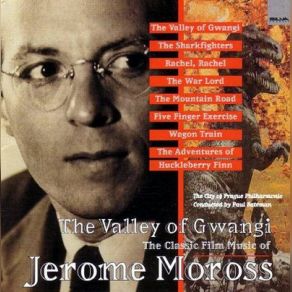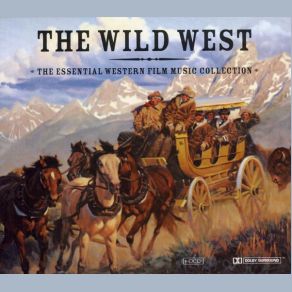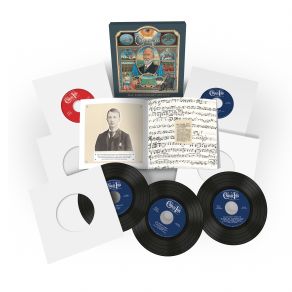Jerome Moross
Wikimp3 information about the music of Jerome Moross. On our website we have 9 albums and 15 collections of artist Jerome Moross. You can find useful information and download songs of this artist. We also know that Jerome Moross represents Theatre/Soundtrack genres.
Biography
[Edit]Jerome Moross was one of those composers who, despite some notable success, was cursed by anonymity before the public for much of his career. He wrote at least two of the most well-known pieces of film music associated with Western subjects ever to come out of Hollywood — the music for William Wyler's The Big Country (1958) and the main theme from the long-running series Wagon Train, which is still instantly recognizable 40 years after the show left the air — yet few outside of the "the business" ever knew his name. In another reality, he'd have been at least as well known as Elmer Bernstein, or might've seen the concert hall success of his older contemporary Aaron Copland, but he wasn't to live long enough even to see tributes to his work as a movie composer.
Moross was born in Brooklyn, New York, in 1913, the middle of three sons in a Jewish family that had no special contact with the arts, except for enjoyment. Jerome made up for that, learning to play the piano by ear when he was four and composing starting at age eight. He attended DeWitt Clinton High School for the Performing Arts in Manhattan, where one of his older classmates and best friends was Bernard Herrmann. He was so advanced academically, that he ended up skipping four grades between elementary school and high school, and so was 14 when he finished high school — an impressive achievement, but one that also left him very lonely for much of his boyhood, as he had few peers his own age to whom he could relate, owing to his deep interest in the modern music being composed in the 1920s. He attended New York University and also entered the Juilliard School of Music, starting there while in his senior year at NYU as a conducting fellow. Ironically, for a man who became best known for the music he wrote, Moross never actually studied composition — he took everything relating to it, including harmony, counterpoint, fugue, but as he told scholar John Caps in a 1978 interview, "I always felt: I don't want to learn how somebody else writes." He knew the workings of an orchestra, having played in pit orchestras from his mid-teens, and was already composing in his own style — at 17, he'd already written one orchestral piece, "Paeans," and there was nothing that Juilliard could add to the direction that his work was taking, in terms of composition teaching.
Working on his own, he tried and abandoned the serial composition language espoused by Schoenberg, Berg, and Webern, and then turned toward the music around him — like Gershwin, but in his own style, he developed a style influenced by blues and jazz, and at 19 published an orchestral piece called "Those Everlasting Blues." His goals were loftier than writing hit tunes, or even getting a successful musical mounted, however — he saw the theater as a vehicle for multi-tiered creative efforts, integrating story, dance, and song on a level closer to opera than to the light confections that Broadway favored in the 1930s. He was a man beyond his time — in decades to come, figures such as Stephen Sondheim would realize some of what Moross proposed to do, in the milieu in which he wished to do it, but in the 1930s he was proposing to offer what amounted to symphonies to a public that wanted songs. As a composer of serious music, he was as successful as most men ever get to be in their own time, with a symphony that was performed and ballets (most notably Frankie and Johnny) that were presented, and he even saw some limited success on Broadway in the early '50s, but he was eclipsed in the concert hall by Copland, and in avant-garde theater by his more media-friendly (some would say shamelessly publicity conscious) Boston-born contemporary Leonard Bernstein.
Moross turned to the Hollywood soundstage for a living just after World War II, initially as a composer in the field of low-budget B-movies — Close-Up (1948), dealing with neo-Nazis in America, was his first, but by the early '50s he'd moved up to major studio productions, including When I Grow Up (1951) and Captive City (1952) at United Artists, the latter a fact-based crime story directed by Robert Wise. He worked intermittently on his own movie scores throughout the 1950s, also orchestrating those composed by others, in between and around his one big Broadway success, The Golden Apple. In 1958, Moross wrote the music for two movies, The Proud Rebel and The Big Country. The latter — which had a score nearly as long as some whole movies — proved to be one of Moross' most enduring achievements in the field. From the main title theme to the final bars, the 74 minutes of music proved a hit with the producers, who — seeing what they had in hand — turned this into Moross' first commercial soundtrack album release, on the fledgling United Artists label, and later it became a hit with audiences. It ultimately earned Moross his only Academy Award nomination. As popular and honored as the latter score was, however, Moross' work on a movie the following year, called The Jayhawkers, proved to be much more lucrative — the series Wagon Train, which had been running since 1956, was undergoing a retooling with its jump to ABC in 1962, and Moross took one of the cues from The Jayhawkers, a rangy piece of music originally designated "Two Brothers," and transformed it into the new title theme for the series. The latter ran weekly right into the middle of the 1960s, and for years after that in syndication across the United States. During this same period, Moross is also credited by some sources with composing music for Gunsmoke and other Western series.
Moross continued to work on musical projects until the outset of the 1960s and also wrote an opera, Sorry, Wrong Number, and a large body of chamber music, but it was his film and television work that kept him solvent and busy, on pictures such as The Cardinal, The War Lord, Rachel Rachel, and The Valley of Gwangi — the latter, a fantasy-Western involving dinosaurs, recalled The Big Country, as did his title music for the two-season CBS oater Lancer. Moross' last formal compositions dated from the late '70s. The Big Country score lingered in the memory, even though the soundtrack album was deleted, and, ironically, the title theme served as a jumping-off point for the progressive rock group Yes on their version of the Richie Havens song ""No Opportunity Necessary, No Experience Needed," the piece's string-laden scoring transformed into a compelling Hammond organ riff by Tony Kaye. Moross passed away in 1983 just a few days short of his 70th birthday, of congestive heart failure and complications from a stroke.
In the decades since his death, his music has finally been granted the respect that it deserved. In addition to a full re-recording of his music from The Big Country and his other most popular movie scores, in 1997 RCA released a CD of the original cast recording of Moross' 1954 stage success Golden Apple, and as of 2005 there were at least two full anthologies of his film music out of CD.
Title: The Cardinal (Original Motion Picture Soundtrack)
Artist: Jerome Moross
Genre: Theatre/Soundtrack
Title: The Big Country (Soundtrack from the Motion Picture)
Artist: Jerome Moross
Genre: Theatre/Soundtrack
Title: The Big Country (Theme from "The Big Country" Original Soundtrack) - Single
Artist: Jerome Moross
Genre: Pop
Title: The Valley Of Gwangi - The Classic Film Music Of Jerome Moross
Artist: Jerome Moross
Genre: Theatre/Soundtrack
Collections
Title: Original Soundtracks Overtures
Genre: Theatre/Soundtrack
Title: Scenes Of The American West
Genre: Theatre/Soundtrack
Title: Imprescindibles Temas del Cine del Oeste
Genre: Theatre/Soundtrack
Title: The Longest Day - Ultimate Collection (CD 3)
Genre: Pop
Title: The War Lord (Original Soundtrack)
Genre: Theatre/Soundtrack
Title: Classic Cinema (Original Soundtrack) (CD3)
Genre: Theatre/Soundtrack
Title: 101 Film Classics 2016 (CD6)
Genre: Theatre/Soundtrack
Featuring albums
Title: Festival Concert 13
Artist: Marc Reift Orchestra, Philharmonic Wind Orchestra Marc Reift
Genre: Rock
Title: Wagon Train - Original Music from The TV Series
Artist: Various Artists
Genre: Theatre/Soundtrack





























